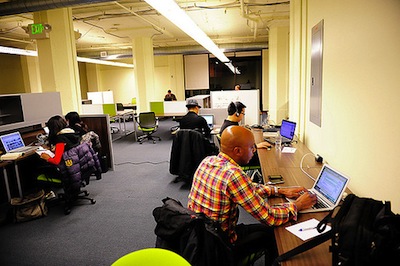 As my co-founders and I investigated the idea of creating Founders Den, we frequently heard the questions: “What is the difference between an incubator, accelerator, and co-working space?” and “Is there a need for another one?”
As my co-founders and I investigated the idea of creating Founders Den, we frequently heard the questions: “What is the difference between an incubator, accelerator, and co-working space?” and “Is there a need for another one?”
The incubator concept was largely defined in the dot-com era by Bill Gross’ IdeaLabs and Guy Kawasaki’s Garage.com, both of which turned out to be expensive endeavors providing office space, legal, financial, and other shared services to start-ups in exchange for equity. More recently, accelerators have emerged as a sort of ‘incubator light’ with an emphasis on education, coaching, limited services, and in many cases no shared office space. Accelerators including TechStars, Y Combinator, and others across the US and globally, bring experienced business leaders and first-time entrepreneurs together in hopes of helping startups avoid costly mistakes.
In stark contrast are co-working spaces which typically provide no services other than a desk, chair, and Internet access. This latter category interested us as we looked to create a place where we would work on our latest startups under a shared-roof with other experienced entrepreneurs.
With an estimated 400 startups in the SoMa neighborhood of San Francisco, we discovered a variety of co-working spaces including Next Space, Citizen Space, SOMA Central, The Hub, and others equally noteworthy. Likewise in New York City there are General Assembly, Dogpatch Labs (also in SF), Wix Lounge, and many more.
AI Weekly
The must-read newsletter for AI and Big Data industry written by Khari Johnson, Kyle Wiggers, and Seth Colaner.
Included with VentureBeat Insider and VentureBeat VIP memberships.
According to Elizabeth Hart of Cornish & Carey, more than 100,000 square feet of co-working facilities have opened up in San Francisco in the last six months. As a direct response to companies doing more with less, she notes that this is a successful growing trend where commercial building owners are rethinking their business models and some are moving into the co-working/smaller tenant hosting model. San Francisco is largely following New York City in this trend with Chicago, Los Angeles, and other cities jumping on as well.
As we investigated whether San Francisco needed another co-working space, we learned that not all co-working spaces are created equally. Some, such as i/o Ventures or AngelPad, are more of an accelerator program, others such as parisoma, Rocket Space, and The Hub will rent by the month or in some cases, by the day, to anyone willing to pay the fee.
Most co-working spaces lack a curation process which we saw as important to creating a dynamic, iron-sharpens-iron community, similar to the traditional private clubs which appealed to the entrepreneurs of prior innovation eras (steel, railroad, oil, etc.). In New York, SoHo House and The Core (while less of a co-working space and more of a lounge) appeal to entrepreneurs. With Founders Den, we sought a unique, differentiated model of one-half private club and one-half co-working space.
It remains to be seen whether ‘the Den’ will create a long-term community of Silicon Valley/San Francisco entrepreneurs, but we have a growing list of industry leaders, advisors, and serial entrepreneurs who are using the clubhouse for social or business purposes.
Like any other real-estate trend, expansion and contraction is likely. Some co-working spaces will succeed and others will struggle.
 However, one thing is sure: The traditional model of startups leasing their own office, buying their own copy-machines, hiring receptionists, office managers, cleaning services, etc., may best serve those companies which have validated their business models, closed a large funding round, and are flush with cash. For all others, we can expect the market to meet the demand for this new style of working, with a variety of options that appeal to all types of entrepreneurs.
However, one thing is sure: The traditional model of startups leasing their own office, buying their own copy-machines, hiring receptionists, office managers, cleaning services, etc., may best serve those companies which have validated their business models, closed a large funding round, and are flush with cash. For all others, we can expect the market to meet the demand for this new style of working, with a variety of options that appeal to all types of entrepreneurs.
Jason Johnson (second from right in the photo) is an entrepreneur, as well as managing partner & co-founder of Founders Den.
[images via Flickr/Founders Den]
VentureBeat's mission is to be a digital town square for technical decision-makers to gain knowledge about transformative enterprise technology and transact. Learn More